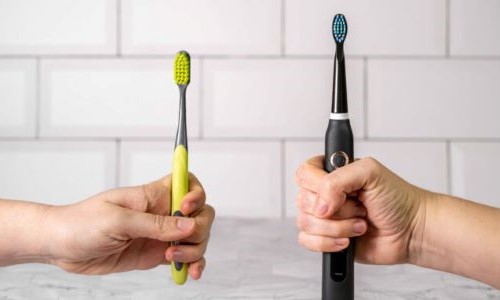When it comes to choosing the right toothbrush, the decision between manual and electric brushes can be overwhelming. Each option has its own benefits and drawbacks, and understanding these can help you make the best choice for your oral health.
Manual Toothbrush: Pros and Cons
Pros:
- Affordable and Accessible: Manual toothbrushes are widely available and inexpensive, making them accessible for everyone. You can easily find them at any store.
- Portable and Convenient: With no need for batteries or charging, a manual toothbrush is easy to use anywhere, making it ideal for travel.
- Complete Control: Using a manual toothbrush allows for full control over the pressure and motion applied while brushing, which can be helpful for those with sensitive teeth or gums.
Cons:
- User Effort: Effective brushing with a manual toothbrush relies on proper technique, which some may find challenging to maintain for the recommended two minutes.
- Inconsistent Cleaning: It’s easy to miss spots or apply too much or too little pressure with a manual brush, leading to less effective cleaning.
- No Built-In Timers: Without built-in timers, it’s harder to track if you’re brushing long enough to thoroughly clean your teeth.
Electric Toothbrush: Pros and Cons
Pros:
- Superior Cleaning Power: Electric toothbrushes, with their rotating or vibrating heads, often provide more consistent and thorough cleaning than manual brushes, reaching areas that might be missed.
- Built-In Timers: Most electric toothbrushes come with a two-minute timer to ensure you’re brushing for the recommended duration, improving your overall oral hygiene routine.
- Easier for Those with Limited Mobility: For individuals with conditions like arthritis or limited dexterity, electric toothbrushes require less effort and can be easier to handle.
- Fun for Kids: Many children find electric toothbrushes fun to use, which can encourage better brushing habits from a young age.
Cons:
- Higher Cost: Electric toothbrushes are generally more expensive than manual ones, with the added cost of replacement heads and potential battery or charging issues.
- Less Portable: Electric toothbrushes can be bulky and require access to power for charging, making them less convenient for travel.
- Over-Reliance: Some users may rely too much on the technology and not focus on brushing technique, potentially leading to uneven cleaning.
Which Should You Choose?
The choice between a manual and electric toothbrush ultimately depends on your personal preferences and dental needs. While electric toothbrushes offer enhanced cleaning and ease of use, manual toothbrushes are affordable, portable, and effective when used correctly. Regardless of which you choose, the key is to maintain proper brushing technique, brush for two minutes twice a day, and replace your toothbrush regularly for optimal oral health.












